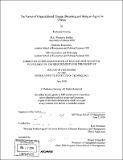The pursuit of organizational change : becoming and being an agent for change
Author(s)
Huising, Ruthanne
DownloadFull printable version (10.84Mb)
Other Contributors
Sloan School of Management.
Advisor
Paul Osterman.
Terms of use
Metadata
Show full item recordAbstract
This dissertation addresses two questions: How do employees become mobilized to initiate and drive change in organizations? How do managers draw on external and internal resources in introducing and sustaining change projects? I answer these questions using business process redesign (BPR) as a case of organizational change. To answer the first question I analyze the experiences of 57 employees selected to participate on one of seven change teams. I identify the amalgam of experiences through which employees, although not necessarily successful in changing their own organization, develop a commitment to working for change across organizations. In answering the second question, I consider how managers use the resources provided by promoters of BPR and the resources and circumstances of the firm. Drawing on data from the introduction of organizational change projects in five organizations and career interviews with 30 managers who began working on organizational change projects in the early 1990s, I find that the actors' relationships to the larger industry of BPR practitioners change with experience. Actors decouple themselves from the prescriptions, language, and tools provided by the BPR community and increasingly draw on their own experiences and local resources. There is one important exception. Organizational actors continue at relationship with the BPR community that allows them to sustain their ideological commitment to the principles of BPR. In answering the questions set out above, I reconnect isolated cases of organizational change with environmental forces and actors. I move between the experiences and struggles of organizational actors and the supports and possibilities offered up by actors in the economy-wide BPR industry. In creating this connection between organizational change and the environment, I reconceptualize change projects as more than a means of changing an organization. (cont.) They are sites of cultural production and reproduction. Whether or not organizations change, BPR projects have the potential to change people and produce actors who continue to reproduce BPR across organizations.
Description
Thesis (Ph. D.)--Massachusetts Institute of Technology, Sloan School of Management, 2008. "June 2008." Includes bibliographical references (leaves 138-148).
Date issued
2008Department
Sloan School of ManagementPublisher
Massachusetts Institute of Technology
Keywords
Sloan School of Management.